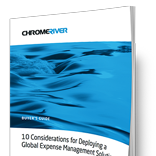Effective travel and expense budget management can be tricky. Late expense submissions or miscategorised GL allocations, for example, can wreak havoc for finance and accounting teams. Thankfully, business rules-based expense management solution, combined with policy stipulations on expense submission can significantly lower the challenges that this can pose.
However, for some organisations, the issue of budget management goes significantly beyond this. Whereas most business’ travel and expense budgets are a single pot which is allocated by departments or business units at the beginning of the financial year, some organizations – such as professional services firms or higher education institutions – have very specific budgets and spend policies for different clients or grants. Client-specific policies must be cross-referenced before an expense can be approved, or budgets may need to be checked before a purchase can be made.
For law firms, for example, it can sometimes be required that client hours have been entered into the billing system before a related expense submission can be made. This has traditionally required the approver to manually cross-check expenses against the billing system.
Universities, on the other hand, may need to check on a specific grant’s budget before pre-approving an expense, such as a travel booking. This has traditionally been an admin-intensive process, requiring manual verification against grant tracking systems before expenses can be pre-approved, and the funds encumbered within the budget.
For any approver who needs to review more than just a couple of these, the need to repeat this process over and over is maddening, incredibly inefficient and costly. Even though it may be a simple yes/no decision (e.g. “do we have these funds available?”) which doesn’t require any kind of judgement call, it can still take a significant chunk of the approver’s time and forces them to stop and re-start the task they were working on.
So, how can organisations overcome this challenge and cut out these repetitive processes? This question was posed to us recently by one of our customers, which is one of the world’s largest law firms. It needed an efficient solution for verifying client billable activities before an expense can be approved for submission. The approach we came up with is based on Intelligent Automation: creating a solution that can automate manual processes without removing the element of control from internal teams. We called it the Chrome River Autobot.
Working hand-in-hand with our customer’s IT and finance teams, we developed the Time Validation Autobot, which works alongside the firm’s internal systems to make decisions based on its internal policy regulations. Our customer’s Time Validation Autobot automatically connects Chrome River to its billing tracking system via an API. It will then check if the submitter has entered the required number of billable hours on the day the expense was incurred and will return the expense to the submitter if not. This is all done automatically with a single click from the submitter, removing the burden of responsibility from the approver for verifying that an expense is valid. This both speeds up the billing and reimbursement process and also saves internal resources and money by eliminating the need for manual cross-referencing.
The process is similar in higher education institutions, albeit with a different type of approval processes. For example, when a travel pre-approval is submitted, our Pre-approval and Encumbrance Autobots will both check the availability of funds within a specific grant “pot,” and also reserve those funds, so they can’t be allocated to another user or expense. As is the case with law firms cutting out manual verification of billable hours, eliminating the requirement for budgets to be manually checked and encumbered can have a major time-saving benefit for travel and finance teams with universities.
With Chrome River’s Autobot technology, instead of a manual approver, you can have an automated approver. The automated approver can perform tasks, make decisions, and either approve, return or re-route a line item (or group of items). The ability to customise Chrome River’s Autobots is virtually limitless and can replace any repetitive manual task which requires a yes/no verification, such as checking budgets, validating time on a matter, encumbering budgets or checking with an external audit system. These will allow our customers to eliminate countless hours of repetitive, manual tasks, improve data accuracy and legitimacy between expense and finance systems, and enhance internal and client-related policies.
Search
Subscribe
Latest Posts
Posts by Category
Our choice of Chrome River EXPENSE was made in part due to the very user-friendly interface, easy configurability, and the clear commitment to impactful customer service – all aspects in which Chrome River was the clear winner. While Chrome River is not as large as some of the other vendors we considered, we found that to be a benefit and our due diligence showed that it could support us as well as any large players in the space, along with a personalized level of customer care.
We are excited to be able to enforce much more stringent compliance to our expense guidelines and significantly enhance our expense reporting and analytics. By automating these processes, we will be able to free up AP time formerly spent on manual administrative tasks, and enhance the role by being much more strategic.
